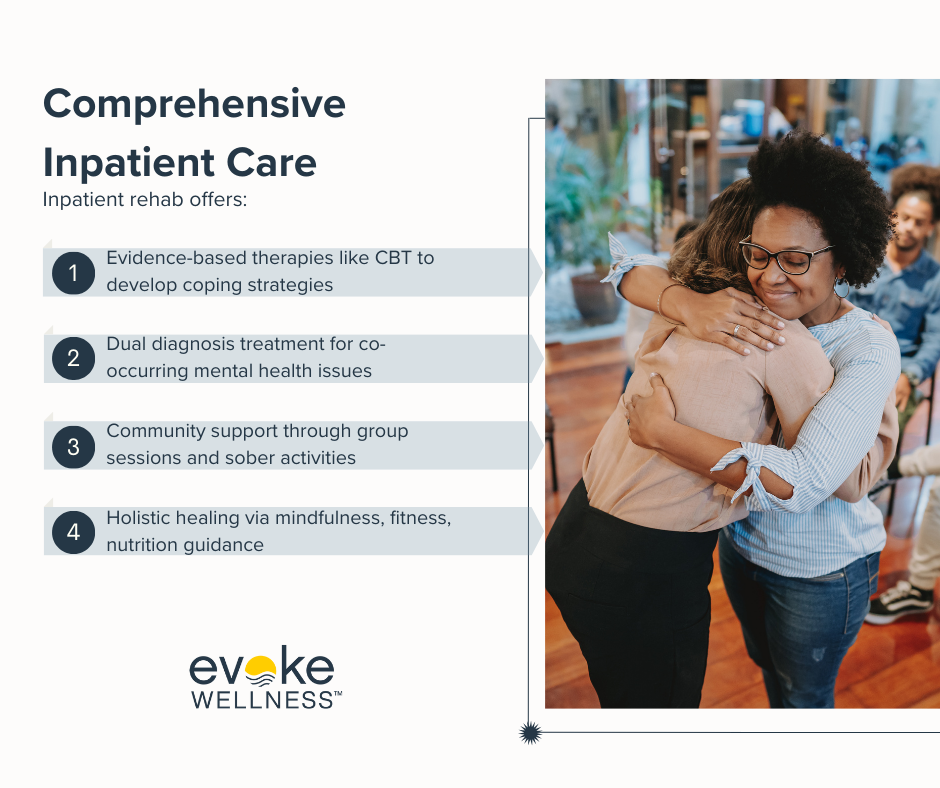As you embark on your journey to recovery, completing detox is a crucial first step. However, the path forward requires ongoing care and support to maintain sobriety. Recent studies show that individuals who engage in follow-up care after detox are 2.5 times more likely to remain substance-free after one year. Post-detox support networks, including residential treatment programs and dual diagnosis care, play a vital role in your long-term success. This article explores the importance of comprehensive aftercare, from medical supervision to substance abuse treatment programs, and how building a strong support system can significantly enhance your chances of sustained recovery.
Together, let’s embrace the journey to recovery and the promise of a new beginning. Call us at (833) 819-6066 today or reach out online.
The Importance of Post-Detox Follow-Up Care
Completing a medical detox is a critical first step towards recovery, but it alone is rarely enough to sustain long-term sobriety. According to research, up to 60% of individuals may relapse within the first year after detox if they do not receive further treatment and support. Post-detox follow-up care is essential to address the underlying causes of addiction and build a strong foundation for lasting recovery.
Comprehensive Addiction Treatment
Overcoming substance abuse requires a multifaceted approach that goes beyond physical stabilization. Comprehensive treatment programs like those offered at Evoke Wellness provide a seamless transition from detox to continued therapies, counseling, and support services that address the psychological, emotional, and social aspects of addiction.
- Cognitive-behavioral therapy and dialectical behavior therapy to develop healthy coping mechanisms
- Dual diagnosis support for co-occurring mental health disorders
- Medication-assisted treatment to manage cravings and withdrawal symptoms
- Alumni programs, sober living homes, and relapse prevention strategies
Personalized Aftercare Planning
Every person’s journey to recovery is unique, which is why personalized aftercare planning is crucial. At Evoke Wellness, experienced professionals work closely with clients to develop comprehensive plans that incorporate evidence-based therapies, support groups, and lifestyle changes tailored to their specific needs and goals.
Ongoing Support and Resources
Recovery is a lifelong process, and maintaining a strong support system is vital for preventing relapse. Evoke Wellness offers a range of ongoing resources, including:
- Alumni events and mentorship opportunities
- Continued access to counseling and 12-step meetings
- Family therapy and education to rebuild trust and improve communication
By prioritizing post-detox follow-up care and embracing a continuum of support, individuals can significantly increase their chances of achieving lasting sobriety and reclaiming a fulfilling, substance-free life.
Residential Treatment and Medical Detox
A Crucial First Step
The journey to recovery begins with detox – the vital first stage of safely ridding the body of addictive substances under medical supervision. Attempting to quit “cold turkey” can be extremely dangerous, especially with alcohol, as severe withdrawal symptoms like seizures and delirium tremens can occur. Medical detox programs provide a controlled environment with 24/7 care to minimize risks and discomforts.
Comprehensive Inpatient Care
However, detox alone is often insufficient for long-term sobriety. Up to 60% relapse within a year after treatment, as underlying psychological factors driving addiction remain unaddressed. Residential treatment combines medical detox with intensive therapies and support services to tackle the root causes comprehensively.

Easing the Transition
The transition from detox to outpatient care is precarious. Lingering withdrawal symptoms like insomnia, mood swings, and lack of motivation are common in this post-acute phase. Residential rehab provides a structured, trigger-free setting to stabilize before rejoining daily life, fostering a solid foundation for lasting recovery.
Building a Supportive Recovery Network
Lean on Loved Ones
Overcoming addiction is a challenging journey that requires a strong support system. Lean on trusted family members and friends who can provide emotional encouragement, practical assistance, and accountability. According to researchers, family involvement significantly improves treatment outcomes and long-term sobriety rates. However, it’s essential to set healthy boundaries and avoid enabling behaviors that could hinder progress.
Join a Community
Surrounding yourself with a compassionate, judgment-free community of peers can be invaluable. Evoke Wellness’ alumni program connects you with others on the recovery path, fostering a sense of belonging and providing wisdom from those further along. Participate in local support groups like AA, NA, or SMART Recovery to expand your network and find mentors who inspire your journey.
Practice Self-Care
Developing healthy coping mechanisms is crucial for maintaining sobriety. Holistic therapies like mindfulness meditation, yoga, and art therapy can help manage stress, regulate emotions, and promote overall well-being. Make time for self-care activities that bring you joy and peace, whether it’s exercise, journaling, or spending time in nature.
Seek Professional Support
Even with a solid support network, ongoing professional support is vital. Aftercare programs offer continued counseling, relapse prevention strategies, and access to resources like sober living homes. Don’t hesitate to reach out for help when needed – recovery is an ongoing process that requires commitment and perseverance.
Maintaining Motivation and Accountability
Sustaining motivation and accountability is crucial for individuals in recovery from addiction. Relapse rates are high, with 40-60% of individuals relapsing within the first year after treatment. Ongoing support is essential to reinforce the progress made during initial detox and treatment programs.
Setting Achievable Goals
One key strategy is to set realistic, achievable goals and celebrate small wins along the way. Breaking down the recovery journey into manageable steps can help maintain a sense of forward momentum and prevent feelings of being overwhelmed.
Regular Check-Ins
Regularly checking in with therapists, counselors, and support groups provides a vital layer of accountability. These connections offer guidance, encouragement, and an opportunity to address any challenges or triggers before they derail progress.
Avoiding High-Risk Situations
It’s also crucial to be proactive in avoiding high-risk situations that could increase the temptation to relapse. This may involve changing routines, environments, or peer groups that were associated with past substance use. Building a supportive recovery community can provide a sense of belonging and shared understanding.
Comprehensive Aftercare Programs
Reputable treatment centers like Evoke Wellness offer comprehensive aftercare programs to support lasting sobriety. These may include sober living homes, ongoing individual and group therapy, relapse prevention planning, and alumni support networks. Evidence-based therapies like CBT, DBT, and ACT are also incorporated to reinforce coping strategies and lifestyle changes.
Maintaining motivation requires commitment, but having the right resources and support system in place can significantly increase the chances of achieving long-term recovery goals.
The Importance of Support Networks
A Lifeline in Recovery
Recovering from addiction is an immense challenge that requires unwavering commitment and a robust support system. A strong network of family, friends, peers, and professionals can be the lifeline that keeps individuals grounded and focused on their sobriety journey. According to studies, family involvement alone can increase treatment retention rates by up to 40%, underscoring the pivotal role of support networks.
Fostering Connection and Belonging
At its core, a support network fosters a sense of connection and belonging – vital elements in overcoming the isolation and stigma often associated with addiction. Peer support groups, facilitated by addiction professionals, create a safe haven where individuals can share their struggles, gain insights from others’ experiences, and receive encouragement and motivation to stay committed to their recovery.
A Multifaceted Approach
Successful recovery demands a multifaceted approach that addresses the physical, emotional, and social aspects of addiction. Comprehensive aftercare support, including therapy, holistic therapies, family involvement, and ongoing guidance from addiction professionals, complements the role of a support network. This holistic approach equips individuals with the tools, coping mechanisms, and community needed to navigate the challenges of sustained sobriety.
Identifying the Need for Additional Support
While detox is a critical first step, it alone is often insufficient to maintain long-term sobriety, with relapse rates as high as 60% within the first year after treatment. Signs that more support may be needed include intense cravings, difficulty managing withdrawal symptoms, changes in attitude or behavior, and problems with personal or professional relationships. Recognizing these warning signs and promptly seeking additional support can increase the chances of regaining and maintaining sobriety.
Frequently Asked Questions: The Importance of Post-Det
Understanding Addiction Recovery
Completing detox is a pivotal first step, but it alone is rarely enough to achieve lasting sobriety. Addiction is a complex disease that impacts the mind, body, and spirit – detox addresses only the physical aspect. According to studies, around 40-60% of individuals relapse within a year after detox without further treatment. Post-acute withdrawal symptoms like cravings, anxiety, and mood disturbances can persist for months, underscoring the need for comprehensive follow-up care.
Continuum of Care
Effective addiction treatment follows a continuum, with medical detox stabilizing the client’s physical state to enable deeper psychological and behavioral work in subsequent phases. Residential or outpatient rehab provides evidence-based therapies, counseling, and holistic support to address the root causes, develop coping strategies, and build a strong recovery foundation. This multi-pronged approach significantly improves long-term sobriety outcomes.
Tailored Treatment Plans
There is no one-size-fits-all solution – the appropriate level of care depends on factors like addiction severity, dual diagnosis considerations, and personal circumstances. Consulting addiction professionals can help individuals navigate treatment options and design a customized plan blending medical detox, inpatient or outpatient rehab, medications, and robust aftercare services for their unique recovery journey.
Rebuilding Lives and Connections
Addiction profoundly impacts families, creating dysfunction and trauma that requires healing together. Family therapy and programs empower loved ones to understand addiction, develop healthy boundaries, and rebuild trust – creating a strong support system that deters relapse. A holistic approach encompassing the physical, mental, social, and spiritual realms gives individuals their best chance at reclaiming fulfilling lives in sobriety.
Conclusion
In conclusion, the journey to recovery doesn’t end with detox. Sustaining sobriety requires ongoing support and care. Recent studies show that individuals who engage in post-detox follow-up care are 50% more likely to maintain long-term recovery. Whether through residential treatment, outpatient programs, or dual diagnosis care, continued support is crucial. Your network of professionals, peers, and loved ones plays a vital role in this process. Remember, recovery is a lifelong journey, and you don’t have to walk it alone. By actively participating in aftercare and leaning on your support network, you’re investing in your future health and well-being. Take the next step in your recovery journey today – your future self will thank you.
Begin Your Journey with Evoke Wellness at Miramar
If you or a loved one is considering treatment, Evoke Wellness at Miramar invites you to contact us. Our compassionate team is ready to answer your questions, discuss your needs, and help you take the first steps toward recovery. In Miramar, you’ll find more than just a treatment program – you’ll discover a community dedicated to your wellness and success. Together, let’s embrace the journey to recovery and the promise of a new beginning. Call us at (833) 819-6066 today or reach out online.


